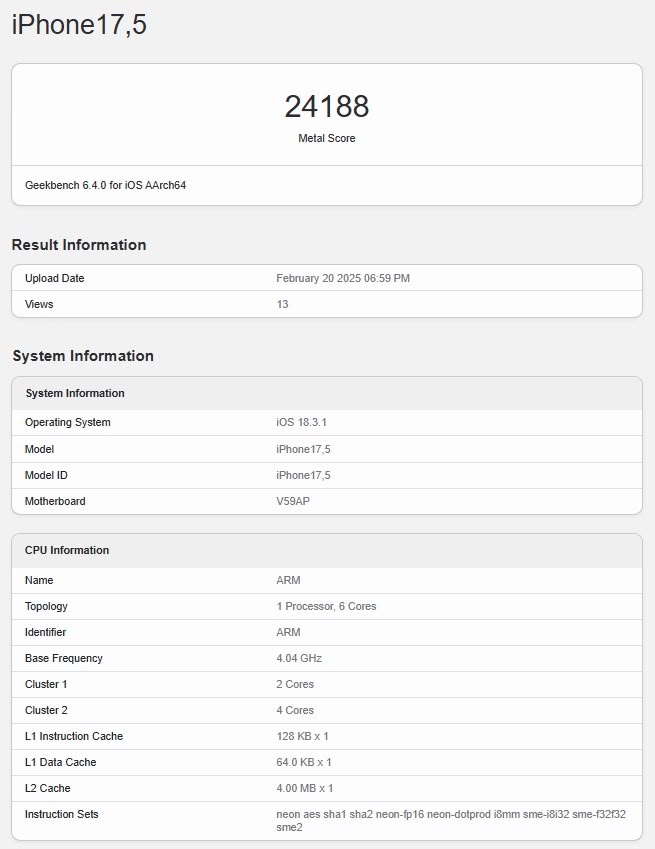02.21.2025
The first Geekbench score for Apple's new iPhone 16e has surfaced, revealing the performance impact of Apple's decision to use a binned version of the A18 chip with fewer GPU

According to Geekbench 6 Metal benchmark results spotted by MySmartPrice, the iPhone 16e scored 24,188 points in graphics testing, which is around 15% lower than the more expensive iPhone 16 and iPhone 16 Plus. This performance difference is likely due to Apple's use of a chip-binned A18 chip. Chip binning is a common industry practice where chips with disabled or non-functional components are repurposed for lower-tier products. This approach helps manufacturers maximize yield and reduce waste while offering products at different price points.
In this case, the A18 chip in the iPhone 16e features a 4-core GPU configuration, compared to the 5-core GPU found in the standard iPhone 16 and iPhone 16 Plus. However, as the Geekbench test shows, the 6-core CPU count remains unchanged.
Despite the reduced GPU performance, the iPhone 16e is expected to maintain strong overall performance, especially for its $599 starting price point. The Geekbench test also corroborates our previous finding that the iPhone 6e has 8GB of RAM, which is a minimum requirement of Apple Intelligence. The device tested was running iOS 18.3.1.

Of course, further benchmark results and real-world testing will be needed to fully assess the impact of the reduced GPU core count on everyday tasks and gaming performance. Apple will be accepting pre-orders for the iPhone 16e starting today at 5 a.m. Pacific Time, and the device launches on Friday, February 28 in 59 countries and regions.
Related Roundup: iPhone 16e
Tags: Geekbench, MySmartPrice
Buyer's Guide: iPhone 16e (Buy Now)
This article, "First iPhone 16e Benchmark Reveals Impact of Reduced GPU Core Count" first appeared on MacRumors.com
Discuss this article in our forums
You may also be interested in this
First Benchmark Result Su…
06.13.2023
The first Geekbench 6 benchmark result for the new Mac Pro surfaced today, providing a closer look at the M2 Ultra chip's CPU performance in the desktop tower. The result
SCMP: Apple’s Mac Studio …
06.16.2023
The new Mac Studio features M2 Max and the new M2 Ultra chip to deliver a huge boost in performance and connectivity in a stunningly compact design that lives right
The first M2 Ultra Mac Pr…
06.14.2023
Macworld Following the appearance of Geekbench 6 speed tests for the M2 Ultra Mac Studio on June 9, MacRumors has spotted the first benchmarks for the similar equipped Mac Pro.
M3 Ultra Chip’s Mas…
03.07.2025
Apple's new M3 Ultra chip can be configured with a massive 80-core GPU, and an early benchmark result offers a look at its graphics performance. In one Geekbench 6 result
Mac Mini vs. Mac Studio B…
06.07.2023
In 2023, Apple updated the Mac Studio with the M2 Max and M2 Ultra chips, with the latter being the most powerful Apple silicon chip to date. Earlier this year,
Mac mini vs Mac Studio: M…
06.15.2023
Macworld At a Glance Our VerdictWe think an M2 Pro Mac mini could be the perfect Mac for many Mac users who may be considering the Mac Studio, but there
Primate Labs Debuts New G…
08.15.2024
Following extended testing under the "Geekbench ML" name, Primate Labs is officially launching its new benchmarking suite optimized for AI-centric workloads under the name Geekbench AI. The tool seeks to
MacBook Air M2 vs M1: Spe…
06.29.2023
Macworld At a glance Our VerdictThe MacBook Air with M2 is a significant improvement over its predecessor. It offers better performance, a more modern design, an improved display and some


